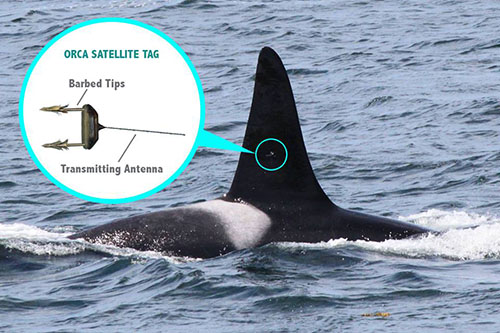— by Lin McNulty —

An example of a satellite tag on an Orca
Following the death of L-pod’s Nigel (L95) last spring, attributed to satellite tagging, NOAA announced today in a press conference that suspension of the practice has been extended pending further investigation and review.
NOAA initially suspended the tagging operation in April after necropsy results indicated that L95 died due to a fungal infection at the dorsal fin tag site. Consideration of alternative ways of collecting information will be part of the review process.
L95 was found floating west of Nootka Island off Vancouver Island on March 30 after being satellite tagged in late February offshore at La Push, WA. The tag functioned for three days in the same general area off the Washington coast before contact was lost.
It was determined that incomplete sterilization during the tagging process contributed to the death. The tagging projectiles are designed to fall out, but petals remained in the wound to L95’s dorsal fin, compromising his health. There is no evidence any tags have been left in any other animals.
Ken Balcomb, Center for Whale Research, said in an earlier press release,”In my opinion, the tag attachment methodology was overly barbaric and defective from the get-go, and the entire tagging program should be rethought and evaluated for efficacy.”
WhaleNet states the cost of satellite tagging ranges from $3,500 to $5,000. There are also the costs associated with attaching the tag. In the case of a whale these costs include a boat, crew, fuel, and travel to the tagging location. And there is a charge for the data transmission time. These tags often stop transmitting after a few days.
The specific purpose of tagging our Southern Resident Killer Whales (SRKW) is to attempt to track the orcas during the winter months when not much is known about their locations and habits.
Further investigation into the death and the tagging practice is expected to take a year, during which time there will be no tagging.
**If you are reading theOrcasonian for free, thank your fellow islanders. If you would like to support theOrcasonian CLICK HERE to set your modestly-priced, voluntary subscription. Otherwise, no worries; we’re happy to share with you.**








